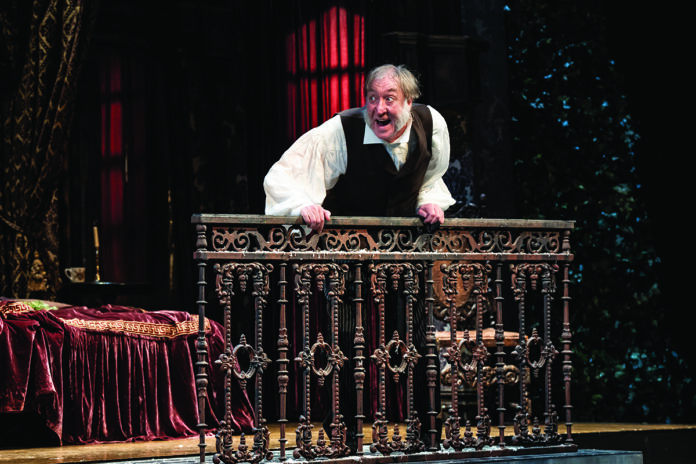Jessica Thebus’s staging of the Goodman’s A Christmas Carol this year includes several changes—not least of which is Christopher Donahue as Scrooge, filling the role played for 16 years by Larry Yando (now onstage as Severus Snape in Harry Potter and the Cursed Child). Donahue’s Scrooge is less waspish and more choleric than his predecessor, but the transformation from bitter miser to openhearted man is no less moving.
The show’s opening now finds narrator Kate Fry (the first woman in that role that I remember seeing) holding a baby and crooning a lullaby in the Cratchit home, which centers that family’s love and compassion for each other in a wholly suitable way. Throughout, Fry’s narrator feels more fully integrated into the proceedings than in past productions (she literally conducts the onstage musicians at one point), which addresses one of the issues I’ve had in the past with Tom Creamer’s otherwise sturdy adaptation.
Other strong touches include William Dick as Marley’s ghost, equal parts fearsome and pathetic as he appears tethered like a demonic puppet by chains—he pulls a similar chain out of the back of Scrooge’s dressing gown to illustrate what his partner has been forging for himself in his cruel and parsimonious life. Deaf actor Robert Schleifer as Mr. Fezziwig signs and embodies the spirit of the holiday without voicing a word (Mark Bedard as son Max Fezziwig delivers the lines vocally; the entire ensemble signs and sings the traditional “We Wish You a Merry Christmas” at curtain call as well, which is a lovely touch). A man at the Fezziwig party is introduced as the “particular friend” of another man—another welcome nod to inclusivity.
Anthony Irons as Bob Cratchit, Susaan Jamshidi as Mrs. Cratchit, and Dee Dee Batteast as Frida, Scrooge’s loving niece, provide temporal emotional ballast for the otherworldly ghosts played by Lucky Stiff (Christmas Past), Bri Sudia (Christmas Present), and Amira Danan (Christmas Future, who looks like a ghastly Victorian sphinx, surrounded by black butterflies in Jillian Gryzlak and Rachel Anne Healy’s puppet design). When Sudia’s Present returns near the end of her time with Want and Ignorance, it hits particularly hard this year. “Most of all beware Ignorance, for on their brow I see that written which is Doom, unless the writing be erased.”
After the election, one hopes it isn’t too late, and I’m certainly not holding my breath waiting for ghosts to change the tenor of the incoming administration. But in the meantime, Goodman’s annual chestnut reminds us that our time here is short, and we should be taking better care of “our fellow passengers to the grave.”






